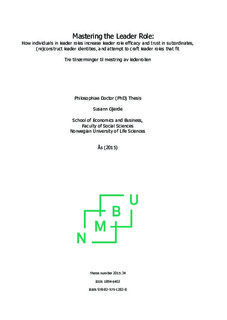Mastering the leader role : how individuals in leader roles increase leader role efficacy and trust in subordinates, (re)construct leader identities, and attempt to craft leader roles that fit
| dc.contributor.advisor | Ladegård, Gro | |
| dc.contributor.advisor | Abrahamsen, Frank | |
| dc.contributor.author | Gjerde, Susann | |
| dc.date.accessioned | 2018-02-28T14:30:27Z | |
| dc.date.available | 2018-02-28T14:30:27Z | |
| dc.date.issued | 2018-02-28 | |
| dc.identifier.isbn | 978-82-575-1282-8 | |
| dc.identifier.issn | 1894-6402 | |
| dc.identifier.uri | http://hdl.handle.net/11250/2487827 | |
| dc.description.abstract | People have a psychological need to master their environment and the roles they enact (Ashforth, 2001). Individuals who take on leader roles are no exception. However, as the leader role is filled with complex, demanding, conflicting and ambiguous role expectations (Conger & Fishel, 2007; Denis, Langley, & Pineault, 2000; Levin, 2010) mastering the leader role may be particularly challenging. This thesis addresses three complementary approaches to mastering the leader role and deals with each approach in a separate paper. | nb_NO |
| dc.language.iso | eng | nb_NO |
| dc.relation.ispartofseries | PhD Thesis;2015:34 | |
| dc.title | Mastering the leader role : how individuals in leader roles increase leader role efficacy and trust in subordinates, (re)construct leader identities, and attempt to craft leader roles that fit | nb_NO |
| dc.title.alternative | Tre tilnærminger til mestring av lederrollen | nb_NO |
| dc.type | Doctoral thesis | nb_NO |
| dc.source.pagenumber | 160 | nb_NO |
Files in this item
This item appears in the following Collection(s)
-
Doctoral theses (HH) [82]
